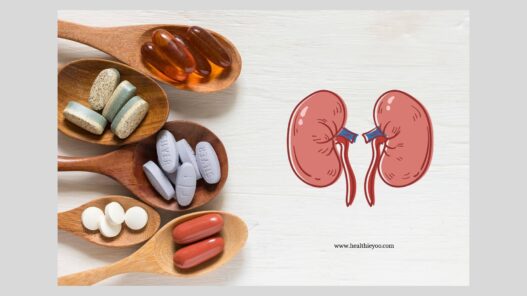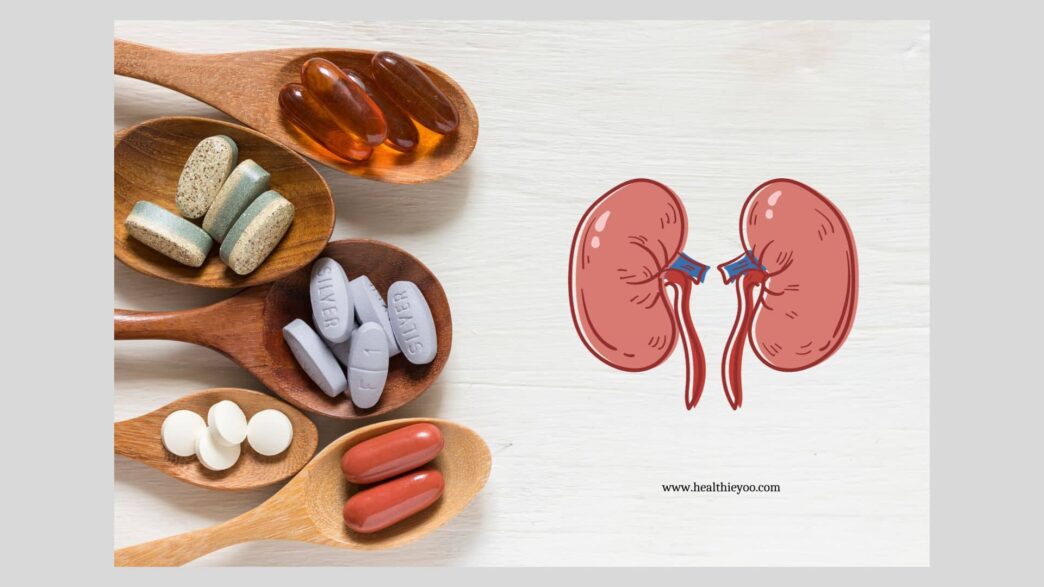So, you just started dialysis and you are wondering what is the right kind of renal vitamins or supplements for me? Since every person with kidney disease has individual needs, it is best to discuss them directly with your doctor and dietitian. The information below on renal vitamins including multivitamins, vitamin D, protein supplements, and probiotics may be helpful to you in talking with your healthcare team.
What kind of renal vitamins or supplements should I take on dialysis?
Multivitamins OR Renal Vitamins?
If you are already taking an over-the-counter multivitamin that is not specifically made for renal dialysis patients, it is best to let your doctor and dietitian know. Generally, most OTC multivitamins are not appropriate for people with kidney disease due to the kidney’s inability to filter certain vitamins and minerals.
Taking a renal vitamin AFTER dialysis is best since the water-soluble vitamins can be lost during treatment. All renal vitamins can be obtained OTC and a prescription is not needed. Your dietitian can help you decide which one is best for you.
Common Renal Vitamin Brands – A Comparison
Below is a comparison of common renal vitamin brands:
Renal vitamins are specifically formulated to address common deficiencies in water-soluble vitamins caused by insufficient diet and dialysis itself. Poor appetite and diet restrictions contribute to vitamin deficiencies. These deficiencies can sometimes go unnoticed although they can be the source of underlying disease.
By taking a daily renal vitamin, you can help replenish your body with lost nutrients. Restoring your body with adequate nutrients can also help improve energy levels which tend to be low immediately after dialysis treatments.
Vitamin D for CKD
Most chronic kidney disease (CKD) patients have low Vitamin D levels due to the kidneys’ inability to convert Vitamin D to its active form so that it can be used. By the time a person starts dialysis, Vitamin D level can be extremely low (under 30 ng/mL). Taking 2000 IUs of Vitamin D3 daily is generally recommended, however, your doctor may prescribe a larger dose to be taken once weekly.
Protein Supplements for CKD
Many dialysis patients suffer from malnutrition and muscle wasting due to many factors. Uremia, especially just prior to starting dialysis, can cause a change in taste resulting in poor appetite. Moreover, the stress your body has in attempting to remove toxins without the help of your kidneys can result in high protein needs. Without sufficient dietary protein, your body is forced to break down muscle tissue resulting in other health problems.
Lastly, once dialysis is started, each treatment can potentially remove up to 10 grams of protein. The amount of protein varies by person and by type and length of dialysis. In short, protein supplements can be helpful for those who are not able to meet their daily protein needs by regular meals alone.
There are few protein shakes that are renal dialysis-friendly. Alternatively, there are several protein bars that may work for you. When choosing the right bar, aim for those that are low in Potassium (under 150 mg/svg), low in Phosphorus (under 200 mg/svg), low in Sodium (under 140 mg/svg), and high in protein (at least 10-20 grams/svg).
To avoid unwanted weight gain, it may be best to choose ones under 200 calories per bar. If you are using a protein supplement as a meal replacement, 300-400 calories per svg may be a good choice. Protein powders can also be used in cooking or as an add-in to beverages such as smoothies. Sometimes, the food label may not list all of these nutrients and their values. Consult with your dietitian on what protein supplements may be appropriate for you.
Probiotics for CKD
Maintaining gut health is essential to help avoid certain health complications with dialysis patients.
Both diarrhea and constipation are common due to the side effects of multiple medications and the reduced ability to remove toxic end-products of digestion. These changes in the intestinal flora can increase the risk for bacterial and fungal infections. The increased progression of cardiovascular disease has also been linked to poor intestinal health. Probiotics are made to help preserve the natural pH and flora of the intestinal tract by replenishing it with friendly bacteria.
Probiotics have been endorsed by the World Health Organization for use by the population to alleviate constipation; infectious and antibiotic-related diarrhea, vaginal, respiratory, stomach, and skin infections; periodontal disease; inflammatory bowel disease, and irritable bowel disease (1). Some common OTC probiotics associated with helping the symptoms of diarrhea are Yakult, Culturelle, and Florastor. DanActive, Activia, and Goodbelly have been associated with improving overall GI health (1).
Some medical professionals do not recommend providing bacteria to immune-compromised persons, although probiotic-related infections are very rare (1). Probiotics also have the potential of containing high amounts of Phosphorus and Potassium which may not be appropriate for some renal dialysis patients. For these reasons, the selection and use of any probiotic should be discussed with your healthcare team.
This article is for informational purposes only and is not a substitute for medical advice or treatment. Consult your physician and dietitian regarding your specific diagnosis, treatment, and health-related questions.
Source
- Renal Nutrition Forum 2014. Vol. 33. No. 1

Cheryl Robinson, MS, MBA, RDN, CSR, LD, is a Registered Dietitian/ Nutritionist (RDN) with a specialty in Renal Nutrition (CSR). She is also a Duke-Trained Health and Wellness Coach and owner of Turn Wheel, LLC Health Coaching and Nutrition Counseling. Cheryl served as 2021 Chair of the National Kidney Foundation Council on Renal Nutrition for the Fort Worth, Texas chapter.











